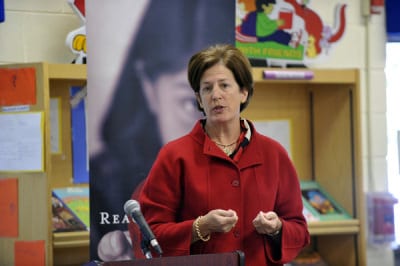On the weekend of March 14-15, 2015, I attended the “Becoming a Core Advocate” training in Raleigh, hosted by Student Achievement Partners. Educators from across the state joined one another to learn more about the Common Core State Standards (CCSS) and strategies for implementing them. As an instructional coach in my district, I work with the standards often, but participating in the Core Advocate training enlightened me in new ways.
Deeply understanding the standards
The Common Core State Standards differ significantly from previous standards. Three words represent those differences: fewer, clearer, and higher. Anchor standards exist across grade levels that represent the outcomes for students. Most focus areas have ten or fewer anchor standards. These anchor standards are adapted at different grade levels in order to help students reach those outcomes. The differences build upon one another, with a clear progression of skills from kindergarten to career and college readiness. Previous standards were a mixed bag of ideas that often repeated or remained unconnected as students progressed through the grade levels. By saying that the standards are higher, we mean that they represent high expectations that every student can engage in deep learning that results in being ready for the next level after high school graduation.
Other important differences include the three fundamental shifts in the Common Core English Language Arts/Literacy Standards from previous standards.
- Regular practice with complex text and its academic language.
- Reading, writing, and speaking grounded in evidence from text, both literary and informational.
- Building knowledge through content-rich nonfiction.
Seeing the standards’ role in student success
To better understand the impact of the Common Core on learning, one can examine any of the shifts. Let’s trace some effects of the shift of “reading, writing, and speaking grounded in evidence from text.” Students (and adults) have access to more information than ever before in human history. Of course, with increased ability to publish and access texts, it is more important than ever to consider whether information is helpful, accurate, and biased. Focusing on the use of evidence in reading, writing, and speaking enables students to become more critical consumers and producers of information. In this way, the CCSS is a response to the needs of the information age.
Another important result of emphasizing textual evidence is that it enhances student access and equity. Rather than asking students questions that set them up for mixed understanding (such as asking “prior-knowledge” questions like “Who has left a tip in a restaurant?” — not every student has had that luxury!), text-dependent questioning encourages all students to start from the same source — the text! Student confusions about how to participate in class discussions, ask their own questions, or write essays end when they realize that the appropriate starting point is textual evidence.
Networking with amazing educators
One of the most powerful aspects of attending Core Advocates was being able to network with some of the smartest and strongest educators in our state. I recognized many of the educators because many lead professional development, win teaching awards, blog about teaching, participate in educational Twitter chats, or go to EdCamps. In other words, these are connected educators who dedicate their lives to improving student learning across our state. Being able to learn from them was a powerful professional experience, and through the Core Advocate network, we will continue to grow together professionally.
We learned more about achievethecore.org, which houses resources for classroom instruction and professional development. We also learned more about how to develop and choose assessments that best measure student progress on the standards. We also had healthy discussion and debates on the purposes of assessments. Assessment to guide learning was a prominent goal in this group, and most agreed that formative assessment has a more valuable role for student progress than traditional high-stakes testing.
Connecting with the community
Although there is some discussion of the future of the standards in North Carolina, I am heartened that there are many statewide supporters of them, including our Governor Pat McCrory, State Superintendent June Atkinson, and NC Teacher of the Year James Ford.
Recognizing our strengths as leaders (because all teachers are leaders) was empowering whether those strengths explicitly relate to the CCSS or other areas. As for connecting with our communities about the standards, my role as a Core Advocate is to provide information about the standards themselves, why and how they came to be, and what their purposes are. I believe that ultimately stakeholders have the final say on their approval of the standards, but to draw those conclusions, they need to have accurate information. I hope this article and its links can contribute to sharing that information with our community.





